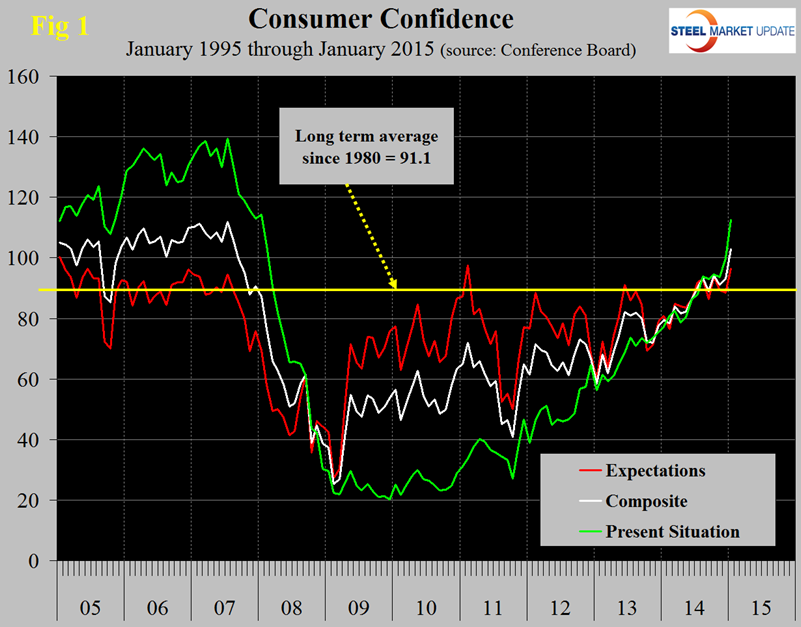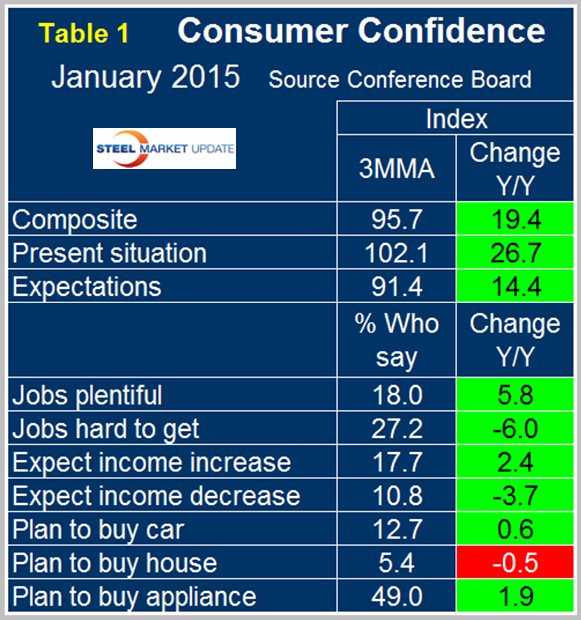Market Data

January 28, 2015
Consumer Confidence in January 2015
Written by Peter Wright
The consumer confidence index as reported by the Conference Board rose strongly in January and the December results were revised upwards. The composite rose from 93.1 to 102.9, the view of the present situation rose from 99.9 to 102.6 as expectations rose from 88.5 to 96.4. This was the first time for the composite to exceed 100 since September 2007 before the recession began. Interesting to realize that this indicator had a one year lead on the steel industry collapse in September 2008. The three month moving averages (3MMA) of the composite and present view and expectations all improved in January. The 3MMA of the composite at 95.7 is now well above the 35 year average which stands at 90.6 since 1980, the 3MMA of the composite, the view of the present situation and expectations are shown in Figure 1.
As with other indicators such as job creation, the recovery from the last recession has been slower than for previous recoveries. The present situation component has been much more volatile over each multiyear time span than expectations since our data began 35 years ago with higher highs and lower lows. The view of the present situation moved ahead of that for expectations in October for the first time since the recovery began in 2009. If history continues to repeat itself, the view of the present situation will now move ahead and widen the differential between it and expectations. On a year over year basis using a 3MMA the composite is up by 19.4 led by consumer’s view of the present situation which is up by 26.7, (Table 1).
The employment sub-indexes, job availability and wage expectations, continue to improve. The pattern (color code) of auto, housing and appliance purchase intentions were unchanged for six months May through October but changed in November when automobiles became negative and appliances became positive. After two months in negative territory, plans to buy a car reversed course in January. May was the first time in over a year that housing had been negative, and it has remained so ever since.
The official statement from the Conference Board reads as follows:
The Conference Board Consumer Confidence Index Increased Sharply
The Conference Board Consumer Confidence Index, which had increased in December, rose sharply in January. The Index now stands at 102.9 (1985=100), up from 93.1 in December. The Present Situation Index rose to 112.6 from 99.9, while the Expectations Index increased to 96.4 from 88.5 in December.
The monthly Consumer Confidence Survey, based on a probability-design random sample, is conducted for The Conference Board by Nielsen, a leading global provider of information and analytics around what consumers buy and watch. The cutoff date for the preliminary results was January 15.
Lynn Franco, Director of Economic Indicators at The Conference Board, said: “Consumer confidence rose sharply in January, and is now at its highest level since August 2007 (Index, 105.6). A more positive assessment of current business and labor market conditions contributed to the improvement in consumers’ view of the present situation. Consumers also expressed a considerably higher degree of optimism regarding the short-term outlook for the economy and labor market, as well as their earnings.”
Consumers’ assessment of present-day conditions was considerably more favorable in January than in December. Those saying business conditions are “good” increased from 24.7 percent to 28.1 percent, while those claiming business conditions are “bad” decreased from 18.9 percent to 16.8 percent. Consumers were also much more positive in their assessment of the job market. Those stating jobs are “plentiful” increased from 17.2 percent to 20.5 percent. Those claiming jobs are “hard to get” decreased from 27.3 percent to 25.7 percent.
Consumers’ optimism about the short-term outlook improved in January. The percentage of consumers expecting business conditions to improve over the next six months rose from 17.8 percent to 18.4 percent, while those expecting business conditions to worsen declined from 9.9 percent to 7.7 percent.
Consumers’ outlook for the labor market was also more optimistic. Those anticipating more jobs in the months ahead increased from 14.6 percent to 16.7 percent, while those anticipating fewer jobs declined from 16.5 percent to 15.0 percent. The proportion of consumers expecting growth in their incomes improved from 16.2 percent to 20.0 percent. However, the proportion expecting a decrease increased marginally, from 10.2 percent to 11.3 percent.
About The Conference Board
The Conference Board is a global, independent business membership and research association working in the public interest. Our mission is unique: To provide the world’s leading organizations with the practical knowledge they need to improve their performance and better serve society. The Conference Board is a non-advocacy, not-for-profit entity holding 501 (c) (3) tax-exempt status in the United States.









